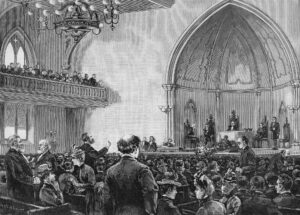Three weeks ago, when the terrible news first broke about the discovery of 215 Tk’emlúps te Secwepemc children in unmarked graves, I was preparing a sermon on Genesis 10. While learning of the haunting realities of residential schools, I heard one Indigenous leader remark that the schools had cemeteries but no playgrounds. Such remarks mingled together with my meditations on Scripture and served to deepen my horror at what has come to light.
Now that another tragic discovery has been made of 751 Cowessess children in Saskatchewan, with heavy heart, I offer these reflections from that recent sermon for a broader audience.
The Passage Being Preached Sets the Course of the Sermon
As many reading this will have no personal knowledge of me or my ministry, please know that these considerations were not brought into the pulpit or this article because this news is recent or to score virtue signaling points. That’s not how I operate. My congregation knows I’m not often one to respond to the previous week’s news. The passage being preached sets the course of the sermon, not the other way around. Preaching Genesis 10, a genealogy of all things, is what warranted immediate and direct comment.
Bear with me to the end as I try to explain why, which is also the reason I sent similar reflections to a well-known and respected Indigenous politician in our country, whose office responded appreciatively.
The Unity of Humanity
The content and location of the genealogy in Genesis 10 showcases the unity of humanity as descended through the sons of Noah after the flood. Many people, tribes, languages, and nations are mentioned, 70 in total, thus representative of the whole. I believe this passage, as others do, teaches that we are all family, and in proximity to Genesis 1:26-27, all made by the Creator God. That alone is enough to enrage us over what has come to light.
But horror at the treatment of these children, and the many others that I hope soon comes to light, goes even deeper than the egregious violation of this inherent unity and dignity. In the genealogy of Genesis 10 there is one line that is singled out, one nation that God especially works with, but not at the expense of all the others. Rather, with the entirety of humanity in view in this passage, we begin to see God’s choosing of one nation from the scattered nations was for the purpose of blessing all nations.
Genesis 10:1 mentions the three sons of Noah: Shem, Ham, and Japheth. The genealogical list then traces their lines in the reverse order from their introduction. In Genesis, the seed of the woman, through whom Messiah comes, is dealt with last to highlight the chosen line (e.g., see Genesis 4 and 5). From this we learn that God worked through the line of Shem, who was the father of the Hebrew people (Genesis 10:21), and from that line came Abram, later known as Abraham.
God entered into a covenant relationship with Abraham, he said, so that through him all nations would be blessed. From the line of Abraham, Jesus was descended (Matthew 1:1), which is how the promise to bless the nations would be fulfilled (Matthew 28:16-20). Through Jesus, there is forgiveness and eternal life for all who believe (Romans 10:13). An abundant life, which is what he came to give (John 10:10). Through his followers, this message was to spread to bring a blessing to all nations (Acts 13:46-48).
Those Who Should Have Blessed Became a Curse Instead
But the complete opposite was experienced by Indigenous people in Canada, and I cannot express the levels of anger and sorrow this generates in me. I am horrified to see pictures of little children standing at a blackboard of a residential school, with the words “Looking unto Jesus” above them, knowing how they were treated by people “in Jesus’ name.” I’m physically nauseated as I write this. And I am sorry. So very sorry to know that those who in name were supposed to bless most were rather a curse instead.
This adds yet another layer to the lament of recent weeks and days, lament that seems so paltry as expressed in these mere words, though my heart is certainly in them. Surely we should take sufficient time to plumb the depths of how wrong this was, on so many levels, in the hope of change, and that as Christians we would live as God intended us to live: to be used by Him to bring blessing to all the peoples, languages, tongues, and tribes of the nations, by sharing the life and message of Jesus with them as he taught.
I heard a quotation once from Augustine, that hope has two beautiful daughters: anger, and courage. Anger at the way things are, and courage to act to ensure that they do not remain as they are. May we be marked by more of this as we move forward, even as we pray truth would come to light, without which there can indeed be no reconciliation.
























